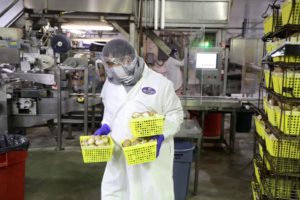Food Recalls and Listeria: What Is This Bacteria?
Recalls of goat cheese, pork, and mushrooms caused by Listeria contamination in North America.
By: Keelin Ferris | December 19, 2021 | 454 Words

(Photo by Bob Carey/Los Angeles Times via Getty Images)
Over the last few weeks, three cases of dangerous bacteria have appeared in foods in the United States and Canada. A range of pork products, two flavors of goat cheese, and one type of mushroom have been recalled. That means they’ve been called back to the factory, so no one can buy them anymore. Food safety organizations doing routing testing found a bacteria called Listeria monocytogenes. It is a disease-causing bacteria found in moist environments, soil, water, animals, and decaying vegetation. Foods can get contaminated with the bacteria when they come into contact with infected environments.
Recent Cases
More than two million pounds of cooked pepperoni and ham products have been recalled, according to the U.S. Department of Agriculture’s Food Safety and Inspection Service (FSIS). At first, the recall was only 230,391 pounds, but later the FSIS recalled even more products. Farther north, the Canadian Food Inspection Agency recalled two flavors of goat cheese.

(Aric Crabb/MediaNews Group/The Mercury News via Getty Images)
Michigan authorities also flagged a brand of enoki mushrooms for Listeria monocytogenes contamination. Enoki mushrooms are a kind of edible fungus and are popular in Japanese, Chinese, and Korean cuisines. Wild enoki mushrooms grow naturally on the stumps of trees. Enoki mushrooms sold in grocery stores and to restaurants are cultivated in dark, controlled environments rich in carbon dioxide. Enoki mushrooms should not be eaten raw and should be cooked to at least 165 degrees Fahrenheit.
What is Listeria?
When foods are contaminated with the bacteria Listeria monocytogenes and are consumed by humans, they can cause a serious infection called listeriosis. Listeriosis is a type of food poisoning. Pregnant women, people with weak immune systems, and adults over the age of 65 are at a higher risk of life-threatening symptoms. Each year, roughly 1,600 people are diagnosed with Listeria food poisoning, and 260 people die from it. Symptoms of Listeria poisoning can include fever, muscle aches, vomiting, headaches, abdominal pain, or nausea. The infection is treated with antibiotics.
Foods more likely to contain Listeria are smoked seafood, deli meats, hot dogs, raw sprouts, raw milk, and soft cheeses. Listeria monocytogenes is transmitted when food is harvested, processed, prepared, packed, stored in, or transported in environments contaminated with the bacteria. Most bacteria cannot grow or survive in freezing or refrigerated temperatures. However, Listeria can, which makes it harder to control.
Regular testing is one way the spread of Listeria and other bacteria is limited. Groups like the FSIS test foods on a regular basis to make sure they are safe for people to buy and eat. Food safety and proper storage are also important in the home, to avoid the growth of harmful bacteria.
















